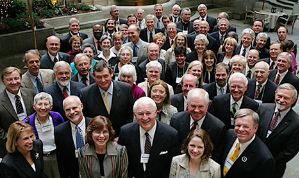
“New Pew Research Center data show that a large majority of Americans think U.S. colleges and universities offer only fair or poor value for the financial cost – but college presidents strikingly disagree, with a majority of them thinking college offers at least a good value … I think a lot of this attitudinal divide relates to the non-market environment in which colleges operate. How do you become a successful college president? You raise lots of money, which you then use to bribe the various constituents in the university community to keep them happy.” — Richard Vedder
by Reed Fawell III
The Southern Association of Colleges and Universities (SACU) is threatening to revoke the University of Virginia’s accreditation on the grounds that the Board of Visitors improperly removed President Teresa Sullivan last year. Why does this obscure organization propose to dictate governance policy to one of the oldest and most respected universities in the country?
There are many reasons. But the root cause is profoundly disturbing: College presidents, who control SACU, are using the accreditation agency as their Trojan horse to strip Virginia state officials and the University’s Board of Visitors of their power to run their flagship state university and to grab that power for themselves.
It’s a brazen coup. College administrators want unlimited control of our state colleges. To seize it, they want to overturn the power of state officials and boards, which from time immemorial have hired, supervised, and removed them. Their chosen vehicle is the SACU, which can impose the ultimate sanction. By denying accreditation, required for students to qualify for federal loans, the association can eviscerate any university’s finances.
Most frightening of all, this coup is being engineered by the small cadre of presidents who run not only SACU but many of the nation’s most dysfunctional schools. Schools with abysmal test scores, schools where most students do not graduate. Schools that promote rampant grade inflation to hide their failure to provide students with a decent education. Schools that encourage non-essential courses that prop up income but delay students’ graduation. Schools that saddle students with debt to pay for the education they often failed to receive… but need to pay off that debt.
In short, these schools set kids up for failure and mortgage their future — and the nation’s future as well. It’s a corrupt system. It’s destroying our kids.
And the college presidents who built this system now want to control our institutions of higher learning lock stock and barrel. Thus, they can avoid accountability and maintain the dismal status quo, largely at taxpayer expense, after depleting the savings of students and parents alike.
Most brazen of all, these college presidents are using the banner of accreditation, integrity and quality to pull off the heist at the university that Thomas Jefferson built!
Why target the University of Virginia? Because the Board of Visitors launched a determined push to fix today’s broken system by finding new ways to bring affordable high quality education to more students than ever. This poses an existential threat to those institutions now failing their students, and the nation as well.
But this assault on the University is not the presidents’ only line of attack. The college presidents are using SACU’s mindlessly oppressive regulation to control other people’s colleges and universities as well. Try to read SACU’s various regulatory documents. They’re frightening in scope, detail, and intrusive power. Note how these documents try to regulate, control and limit the power of college boards — and how few few restrictions they impose on the power and authority of college presidents. Clearly, the objective is to to enlarge the power of of the presidents at the expense of both the board and the faculty. Why? It’s obvious why. The college presidents wrote these documents, and the SACU enforces them.
The SACU also wields immense investigatory power over the faculty. Its rules place enormous burden on the faculty to prove compliance with SACU’s dictates, even to the point of defining the proper social attitudes that will be extended to the investigators. See the 140 page single space small font “Documenting Compliance, Handbook for Institutions Seeking Reaffirmation” pages 25-30 for insight into the coercive regime imposed on faculty. Scholars are treated as imbeciles under this text. And Boards of Trustees fare hardly any better.
Start your reading with SACU’s 140-page, single-spaced, small-font Resource Manual for the Principals of Accreditation. It interprets SACU’s 43-page Principles of Accreditation.
Both these documents purport to lay down “Foundations of Quality.” What they accomplish is to seize control of colleges and universities from boards of trustees, state officials and faculty and vest that control in college and university presidents.
SACU regulations inhibit innovation in areas such as distance learning without an elaborately tedious approval process that provide state college presidents a multitude of ways to thwart change. You can be assured they will do so if such innovation threatens their schools by offering their students a better educational alternative, as it almost surely will.






